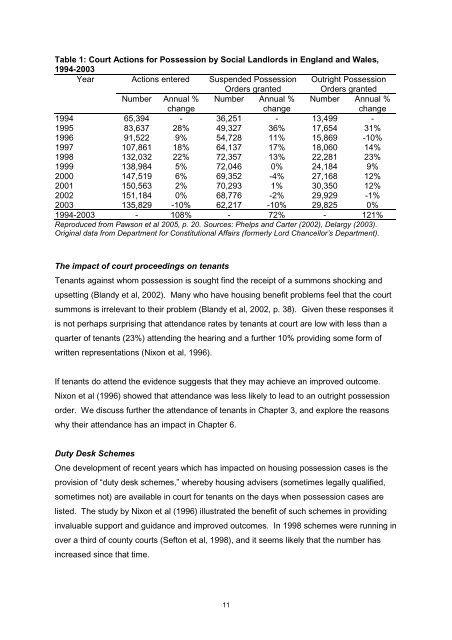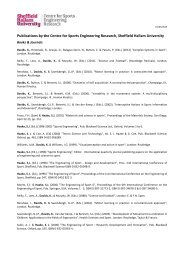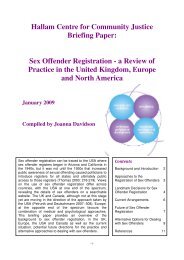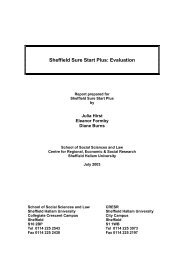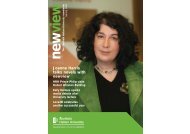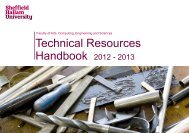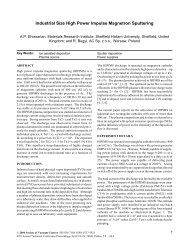The exercise of judicial discretion in rent arrears cases - Sheffield ...
The exercise of judicial discretion in rent arrears cases - Sheffield ...
The exercise of judicial discretion in rent arrears cases - Sheffield ...
Create successful ePaper yourself
Turn your PDF publications into a flip-book with our unique Google optimized e-Paper software.
Table 1: Court Actions for Possession by Social Landlords <strong>in</strong> England and Wales,<br />
1994-2003<br />
Year Actions entered Suspended Possession Outright Possession<br />
Orders granted Orders granted<br />
Number Annual % Number Annual % Number Annual %<br />
change<br />
change<br />
change<br />
1994 65,394 - 36,251 - 13,499 -<br />
1995 83,637 28% 49,327 36% 17,654 31%<br />
1996 91,522 9% 54,728 11% 15,869 -10%<br />
1997 107,861 18% 64,137 17% 18,060 14%<br />
1998 132,032 22% 72,357 13% 22,281 23%<br />
1999 138,984 5% 72,046 0% 24,184 9%<br />
2000 147,519 6% 69,352 -4% 27,168 12%<br />
2001 150,563 2% 70,293 1% 30,350 12%<br />
2002 151,184 0% 68,776 -2% 29,929 -1%<br />
2003 135,829 -10% 62,217 -10% 29,825 0%<br />
1994-2003 - 108% - 72% - 121%<br />
Reproduced from Pawson et al 2005, p. 20. Sources: Phelps and Carter (2002), Delargy (2003).<br />
Orig<strong>in</strong>al data from Department for Constitutional Affairs (formerly Lord Chancellor’s Department).<br />
<strong>The</strong> impact <strong>of</strong> court proceed<strong>in</strong>gs on tenants<br />
Tenants aga<strong>in</strong>st whom possession is sought f<strong>in</strong>d the receipt <strong>of</strong> a summons shock<strong>in</strong>g and<br />
upsett<strong>in</strong>g (Blandy et al, 2002). Many who have hous<strong>in</strong>g benefit problems feel that the court<br />
summons is irrelevant to their problem (Blandy et al, 2002, p. 38). Given these responses it<br />
is not perhaps surpris<strong>in</strong>g that attendance rates by tenants at court are low with less than a<br />
quarter <strong>of</strong> tenants (23%) attend<strong>in</strong>g the hear<strong>in</strong>g and a further 10% provid<strong>in</strong>g some form <strong>of</strong><br />
written representations (Nixon et al, 1996).<br />
If tenants do attend the evidence suggests that they may achieve an improved outcome.<br />
Nixon et al (1996) showed that attendance was less likely to lead to an outright possession<br />
order. We discuss further the attendance <strong>of</strong> tenants <strong>in</strong> Chapter 3, and explore the reasons<br />
why their attendance has an impact <strong>in</strong> Chapter 6.<br />
Duty Desk Schemes<br />
One development <strong>of</strong> recent years which has impacted on hous<strong>in</strong>g possession <strong>cases</strong> is the<br />
provision <strong>of</strong> “duty desk schemes,” whereby hous<strong>in</strong>g advisers (sometimes legally qualified,<br />
sometimes not) are available <strong>in</strong> court for tenants on the days when possession <strong>cases</strong> are<br />
listed. <strong>The</strong> study by Nixon et al (1996) illustrated the benefit <strong>of</strong> such schemes <strong>in</strong> provid<strong>in</strong>g<br />
<strong>in</strong>valuable support and guidance and improved outcomes. In 1998 schemes were runn<strong>in</strong>g <strong>in</strong><br />
over a third <strong>of</strong> county courts (Sefton et al, 1998), and it seems likely that the number has<br />
<strong>in</strong>creased s<strong>in</strong>ce that time.<br />
11


